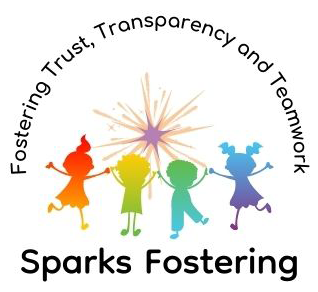Training records
All training and development work is recorded on ‘Training Records’, which are audited regularly.
Learning and development is a mandatory part of working with children. The Sparks Fostering Learning and Development Pathway has the following levels.

Step 1: ‘Fostering application’ and induction training
The training content for step 1 is accessible via the main/home pages of www.SparksFostering.org. It’s expected that applicants will review this information and complete the free quiz (with or without staff support) before formally applying to become foster carers.
Staff and panel members are also expected to review the information on the ‘Fostering application’ pages before they can be offered a post with Sparks Fostering.
The content of the induction pages is then reviewed in more detail during the post-approval induction period for foster carers and during the probationary period for staff.
Step 2: ‘Core Information’
The ‘Core Information’ pages of the website (which can be accessed via a link at the bottom of the home page) provide the fundamental information that is required to be able to offer a fostering service to children in care. It’s important to Sparks Fostering that anyone who aims to support children in care has the information needed to feel confident, informed and assured of their involvement – this can be achieved by reading these pages carefully.
Prospective panel members are required to read the ‘Panel’ pages before they can join panel and they are encouraged to read the other pages. Panel member’s understanding of the induction and panel pages will be reviewed during their induction. Panel members are invited to all workshops and team meetings.
Step 3: Face to face training
In addition to the information on the website, foster carers are encouraged to attend first aid training and restraint training, which may be face-to- face, or a combination of face-to-face and online.
Foster carers are required to find a local certified paediatric first aid training course if the children they are caring for have additional health needs which require the training. St John Ambulance provides courses nationally (www.sja.org.uk); other providers can be used (line managers are to be notified beforehand), and the course should cover basic health and hygiene issues, first aid, health promotion, communicable diseases and any other health needs relevant to the child.
De-escalation and/or safe holding courses can be chosen by applicants themselves (and approved by line managers), or will be recommended by Sparks Fostering if there is an identified risk of behavioural challenges from the child matched to the fostering home.
If specific needs are identified for children in placement, it is expected that foster carers will engage in appropriate training and learning around the specific needs. Learning may be reading around the topic, attending online training, speaking to someone who understand the needs well, or attending formal training.
Where payment is required, it will be budgeted from the monthly learning and development allowance given to all foster carers. Additional funding may be provided by Sparks Fostering upon request.
It isn’t a mandatory requirement for staff to complete first aid or restraint training; however, staff may wish to use their training allowance to complete any relevant training if they wish to.
Step 4: TSDS
It is a legal obligation upon foster carers to complete the ‘Training, Support and Development Standards’ paperwork before their first annual review. The TSDS questions are included on the foster carer training record. Foster carers are encouraged to draft answers as soon as possible. The answers must be finalised before the first annual review.
Step 5: Advanced foster care Resources
Staff and foster carers also have access to additional resources, which is also accessible via the Sparks Fostering website. Whilst it is not a mandatory requirement to read these pages, the knowledge on these pages will help foster carers to be better prepared for the varied needs of children, which is likely to result in better outcomes for the children in our care.
If the children being looked after have specific needs, it becomes mandatory for the foster carers and supervising social worker to access training or literature which helps to meet the child’s needs. The learning must be followed up with a discussion and evidence of learning with line managers.
Social workers should access the optional reading in order to further their professional development. Social workers should be confident and informed about all of the topics so they can discuss the topics with their foster carers and with their line managers (when it’s relevant to do so).
Panel members aren’t expected to read this information; however, they may find it interesting and useful.
Step 6: Using the Training and events allowance
Foster carers and social workers are given a monthly training and events allowance (see ‘allowances and fees’ for figures).
The training and events allowance is used to pay for expenses related to learning, development and other growth. Examples of appropriate use would include:
- Attending training or a course which has a fee
- Purchasing social work or other relevant books
- Specialist therapeutic board games which the foster carer will use with the children to develop relationship or attachment skills.
- Paying expenses for face to face learning and development sessions (this can include mileage or food, or a fee can be agreed for a supervising social worker to deliver training).
- Pooling allowance with other foster carers and/or social workers to access bespoke, specialist training.
- Pooling the allowance with other foster carers and/or social workers to have a social event which encourages improved relationships between carers and social workers e.g. to celebrate a religious festival, or go somewhere on a fun day out.
- Periodically Sparks Fostering may use the learning allowance to organise team events or celebrations; this would be organised in advance and foster carers/staff would be notified.
Foster carers and staff are expected to prioritise the individual needs of the children in their care; for example, the foster carer and social worker of a child with complex medical needs would be expected to ensure that they have good knowledge about the child’s needs, and if this isn’t the case, the training and events allowance should be used to increase their specialist knowledge.
Money can be used at the foster carer or social worker’s discretion; however, the money can’t be claimed until a brief summary can be provided to explain what was purchased, what was learned, how the learning will be applied and proof of purchase.
If the training and events allowance isn’t spent in the allocated month, it can be carried over for three months without prior agreement from a supervisor. A line manager can agree (in writing) to increase the amount that can be carried over if, for example, access to a course costs more than the monthly allowance.
The report must be provided within three months of making the purchase; if the report cannot be provided, an extension must be requested in writing, with proof of purchase and description of the item. Repeated delays in submitting invoices has an impact on the agency’s ability to plan it’s finances; therefore, repeated delays in submitting invoices may be subject to disciplinary action.
Accessibility
Staff, panel members or foster carers who struggle to read and process the information provided on the website, can view and download the information in PDF format. It is also possible to listen to the information via the audio links.
During assessment, the assessor can provide some support in helping the foster carers to understand the information provided (and answer any questions). After assessment, the Training and Events Allowance is used to pay line managers to complete additional face to face work with individuals who aren’t completing their training records.
Additional resources (optional)
AC Education – A leading provider of online and in-person social care and education courses.
Fostering Training – Practical online training designed for fostering.
Grey Matter Learning – An award winning eLearning provider in the social care sector with over 130 online health and social care courses.
My free course – a range of free courses.
New Skills Academy – A range of childcare courses for a low one-off fee or for annual subscription.
NSPCC online training courses: Covering topics such as child protection, online safety and more.
Online foster carer training Staff and foster carers who wish to supplement their learning may access any of the learning on this course. Line managers may also direct their supervisees to complete courses.
Pink Pearl Academy – ‘For parents, carers, teachers, social workers & other professionals working with children: Our short courses offer practical steps to help overcome parenting challenges.
Section 31 training – Offers unique care experienced training delivered by adults who have grown up in the UK care system. This insight provides an in depth look at what it is like to live with trauma and deal with the day to day highs and lows of life in care.
Social Care Training Solutions. Specialists in PACE training. They also have a large number of other training courses.
Social Care TV: Online training. 72 online video courses.
The Foster Care Training Hub. Over 800 courses, many of which are free.







